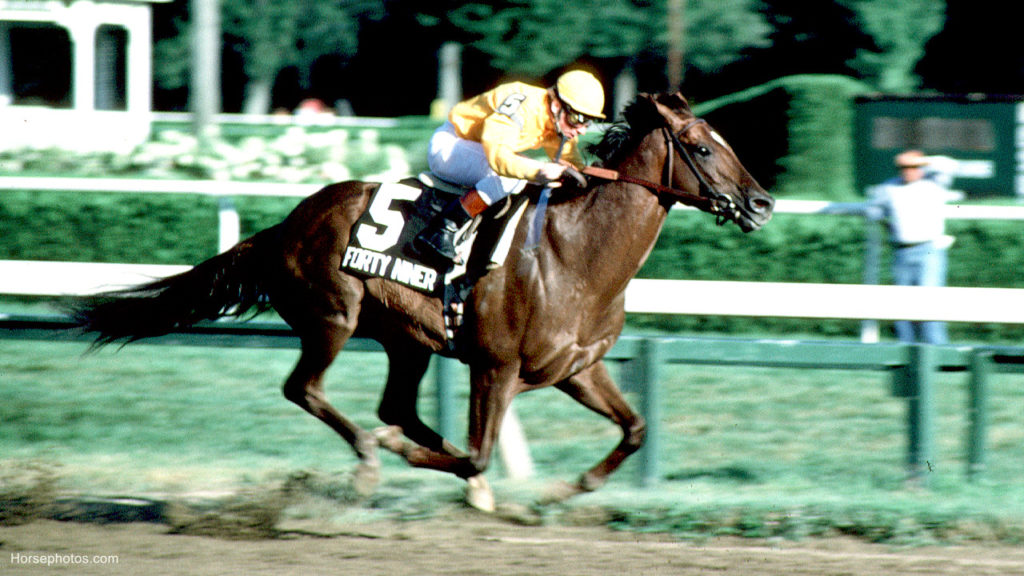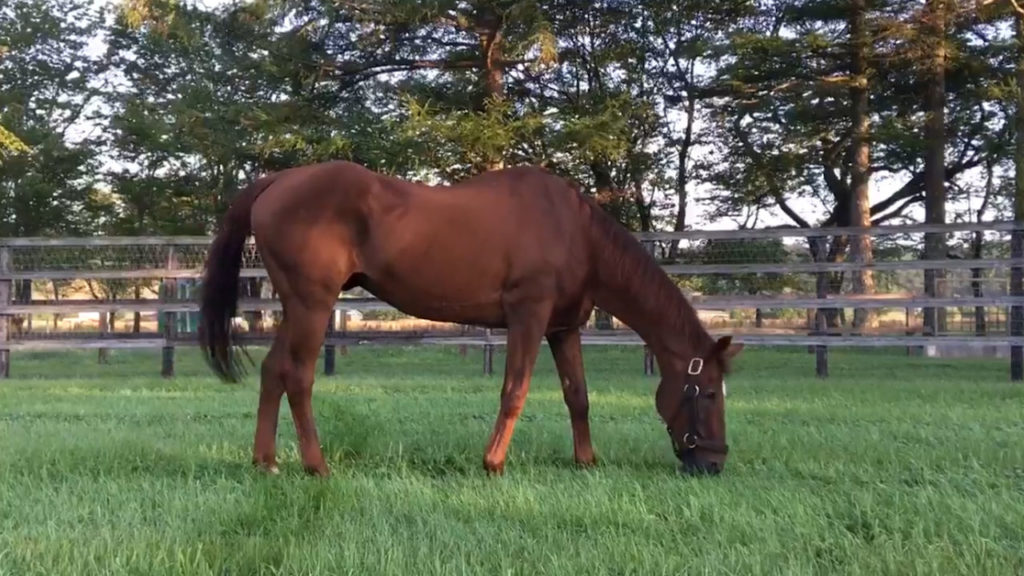
Forty Niner, an Eclipse Award-winning juvenile and Kentucky Derby (G1)-placed colt who became one of the longest lived champions on record while residing for the past quarter-century in Japan, died Monday at the age of 35.
“He had just turned 35 on May 11 and had received many birthday wishes from fans,” wrote Shigeki Yusa, the stallion affairs manager at the Japan Bloodhorse Breeders’ Association, on Twitter. “We are truly saddened to lose him and are grateful for all the support from his fans over the years.”
Bred and raced by Claiborne Farm, Forty Niner was a member of the memorable 3-year-old crop of 1988. The group of colts also included Risen Star, the most successful son of Claiborne stallion Secretariat, and Seeking the Gold and Private Terms, both of whom were bred and raced by longtime Claiborne clients Ogden Phipps and Mr. and Mrs. Stuart Janney, respectively.
The crop also included Winning Colors, who beat them all in the Kentucky Derby while becoming the third and most recent filly to capture the Run for the Roses. That loss stung Forty Niner’s trainer, Woody Stephens, leading to one of the more controversial editions of the Preakness (G1) and temporarily tarnished the reputation of the Hall of Fame conditioner.
Forty Niner’s Early Racing Career

The class didn’t look especially deep at first in the summer and fall of 1987 when Forty Niner won five of six starts to claim juvenile championship honors. After beating noted future sire Dynaformer in his debut at Belmont Park, Forty Niner produced a rare flop in the Saratoga Special (G2), finishing a distant sixth to Crusader Sword.
Forty Niner rebounded 12 days later to claim the Sanford (G2) by more than three lengths, and then convincingly made amends over Crusader Sword with a three-length tally in the Futurity (G1). Forty Niner’s winning margin was 4 1/4 lengths in the Champagne (G1), but he just outlasted an unheralded rival by a nose in the Breeders’ Futurity (G2) at Keeneland in his season finale.
Forty Niner did not contest a relatively weak renewal of the Breeders’ Cup Juvenile (G1) at Hollywood Park, belatedly held that year on Nov. 21 and won by Success Express.
Forty Niner had an active pre-classic campaign of five starts. Second in the Hutcheson (G3) over 7 furlongs, he rebounded to win the Fountain of Youth (G2) by a nose but then lost the Florida Derby (G1) by a neck to longshot Brian’s Time, who would go on to become another prominent member of the crop. Squeezing in two starts at the short Keeneland meet, Forty Niner won the 7-furlong Lafayette S. by five lengths and then lost by a neck to Louisiana Derby (G3) winner Risen Star in the Lexington (G2).
Sent off at 4.90-1 in the Kentucky Derby behind undefeated Wood Memorial (G1) winner Private Terms and Santa Anita Derby (G1) heroine Winning Colors, Forty Niner surged late and missed catching the front-running filly by a neck. Angered that Winning Colors was allowed an uncontested lead and having a bit of a personality clash with the filly’s trainer, D. Wayne Lukas, Stephens vowed she would not get away with similar tactics in the Preakness two weeks later.

No one, however, suspected that Forty Niner would eventually prove a sacrificial lamb in the Pimlico classic.
On a seeming kamikaze mission to derail the filly’s bid, jockey Pat Day hard rode Forty Niner to the lead, repeatedly bumping Winning Colors and keeping her out near the middle of the track. After a suicidal pace neither had anything left to repel Risen Star, who won comfortably, with Winning Colors third and Forty Niner a badly-beaten seventh.
Unimpressed by such unsportsmanlike tactics, Stephens and Day were chastised by many in the racing press. Even Daily Racing Form, which rarely issued editorials as a matter of course, chimed in negatively.
Bypassing the Belmont S. (G1), which Risen Star won by 14 lengths in his career finale while Winning Colors struggled home last, Forty Niner put the Preakness debacle behind him with a series of thrilling performances that summer and fall. After a facile allowance win at Monmouth Park, Forty Niner edged Seeking the Gold by a nose in both the Haskell Invitational (G1) and Travers (G1), the latter a three-way photo that also included Brian’s Time.
An excellent neck second to eventual Horse of the Year Alysheba in an incredibly deep renewal of the 1 1/4-mile Woodward (G1) four weeks after the Travers, Forty Niner made his final pre-Breeders’ Cup appearance in the inaugural NYRA Mile at Aqueduct, which he won in another photo finish.
The Breeders’ Cup Classic (G1) at Churchill Downs was his final career start. Well backed at 7-2, Forty Niner was in striking position into the far turn when, fearing he had injured himself, jockey Julie Krone abruptly took the colt back. By the time the mistake was realized, Forty Niner was last entering the stretch. He rallied for fourth, but more than five lengths adrift of Alysheba and Seeking the Gold.
Retired to Claiborne with a record of 19-11-5-0, $2,726,000, Forty Niner stood at the farm until his exportation in 1995. He was pensioned from stud duty in 2007.
Forty Niner’s most prominent runners were multiple Grade 1 winner Coronado’s Quest and Belmont S. winner Editor’s Note. Another son, Distorted Humor, became a sought-after progenitor in his own right siring dual classic winner Funny Cide as well as Belmont and Breeders’ Cup Classic hero Drosselmeyer. Forty Niner’s other Grade 1-winning offspring included Ecton Park, Gold Fever, and the fillies Nine Keys and Marley Vale.
By Mr. Prospector, Forty Niner was the only stakes winner produced by the stakes-winning File, a daughter of 1965 3-year-old champion Tom Rolfe.
A selection of stakes featuring Forty Niner:
1987 Sanford
1988 Fountain of Youth
1988 Lexington
1988 Kentucky Derby
1988 Preakness
1988 Haskell Invitational
1988 Woodward
1988 NYRA Mile


